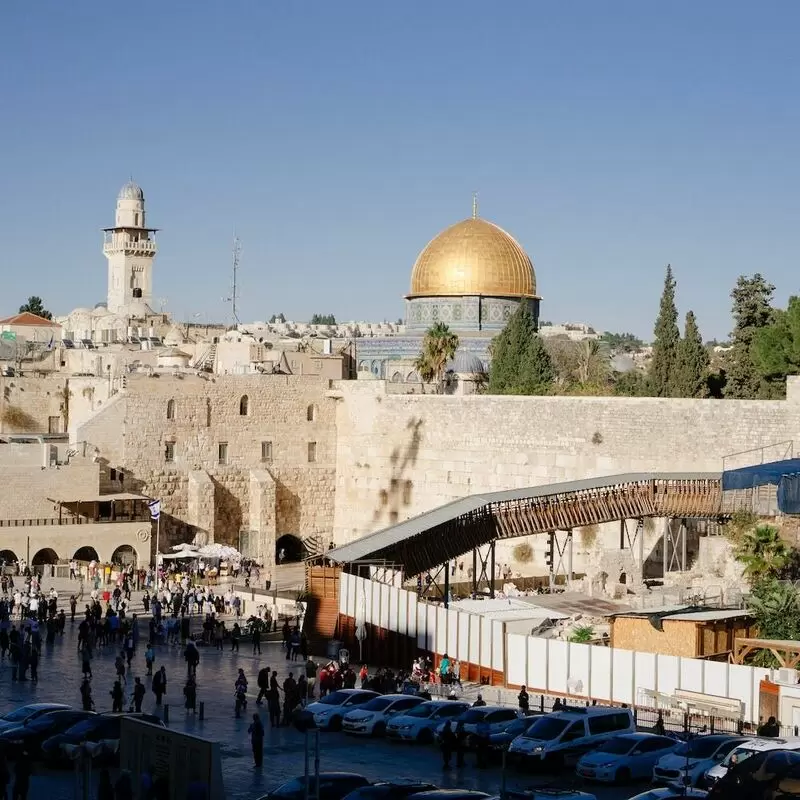
1. Church of the Holy Sepulchre
The Church of the Holy Sepulcher in Jerusalem is of great spiritual significance: it is considered the place where Jesus Christ was crucified, buried and resurrected. As you explore the biblical story in the glittering mosaics and ancient chapels, don't miss the Stone of Anointing, where Jesus' body was prepared for burial. In the Christian Quarter, just a stone's throw away, is the bustling Muristan Market, perfect for exploring local crafts and cuisine after your sightseeing.
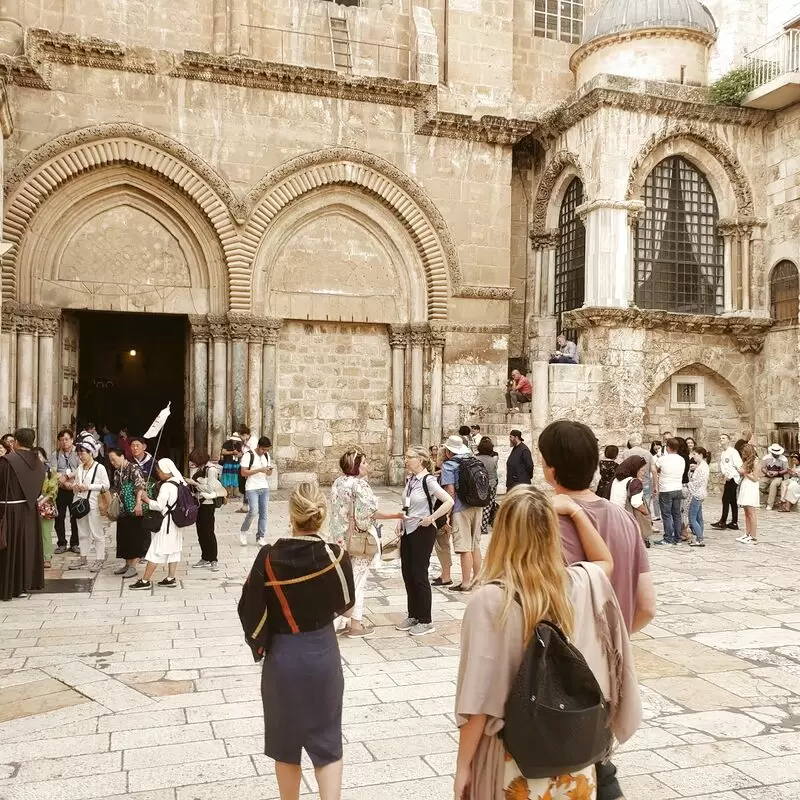 Church of the Holy Sepulchre
Church of the Holy Sepulchre
Jerusalem

Jerusalem
2. The Israel Museum Jerusalem
Experience the phenomenal "Israel Museum, Jerusalem"! This world-renowned museum houses an impressive collection of more than 500,000 artifacts, including the legendary Dead Sea Scrolls and an impressive model of 2nd-century Jerusalem. Its extensive collection ranges from prehistory to modern contemporary art. The "Billy Rose Art Garden," designed by world-renowned Japanese-American sculptor Isamu Noguchi, is a real showstopper and should be visited. A short walk further south you will find the charming "Bible Lands Museum".
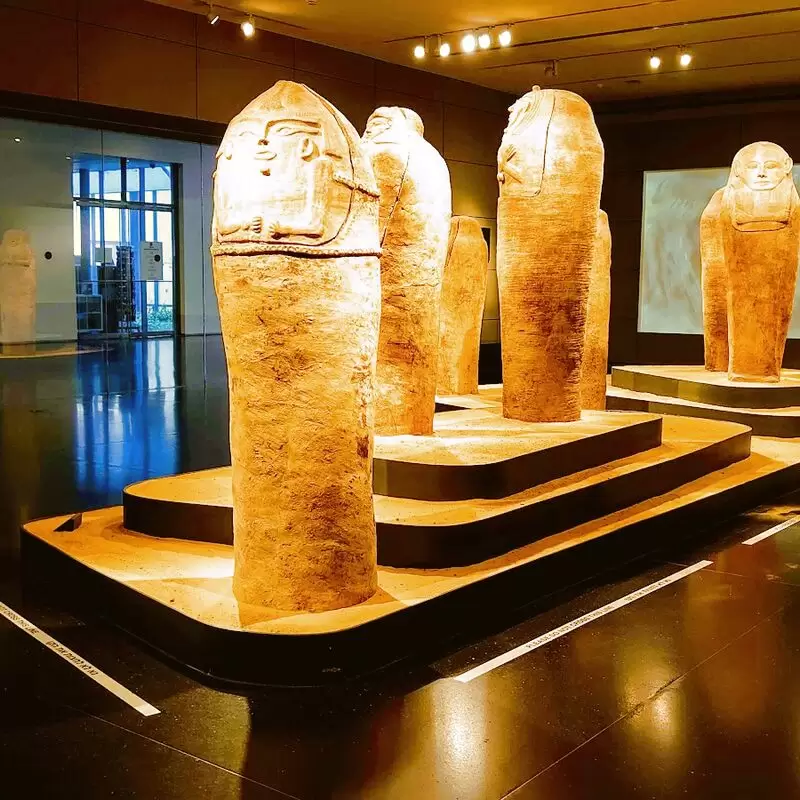 The Israel Museum Jerusalem
The Israel Museum Jerusalem
Derech Ruppin 11, Jerusalem
Monday - Sunday: 10:00 AM – 5:00 PM
Tuesday: 4:00 – 9:00 PM
Friday: 10:00 AM – 2:00 PM

Derech Ruppin 11, Jerusalem
Tuesday: 4:00 – 9:00 PM
Friday: 10:00 AM – 2:00 PM
3. Gethsemane
Discover the silence of the ancient olive trees of Gethsemane and identify with the biblical story that took place here. It is believed that Jesus spent his last night here before his crucifixion. Not only religious tourists, photographers are also attracted by the unique panoramic view of the Old City. Enjoy a quiet stroll in the neighboring Kidron Valley of the Biblical Kings, just a stone's throw away and home to the oldest Jewish burial site in Israel. Hard to believe it's just east of bustling Jerusalem!
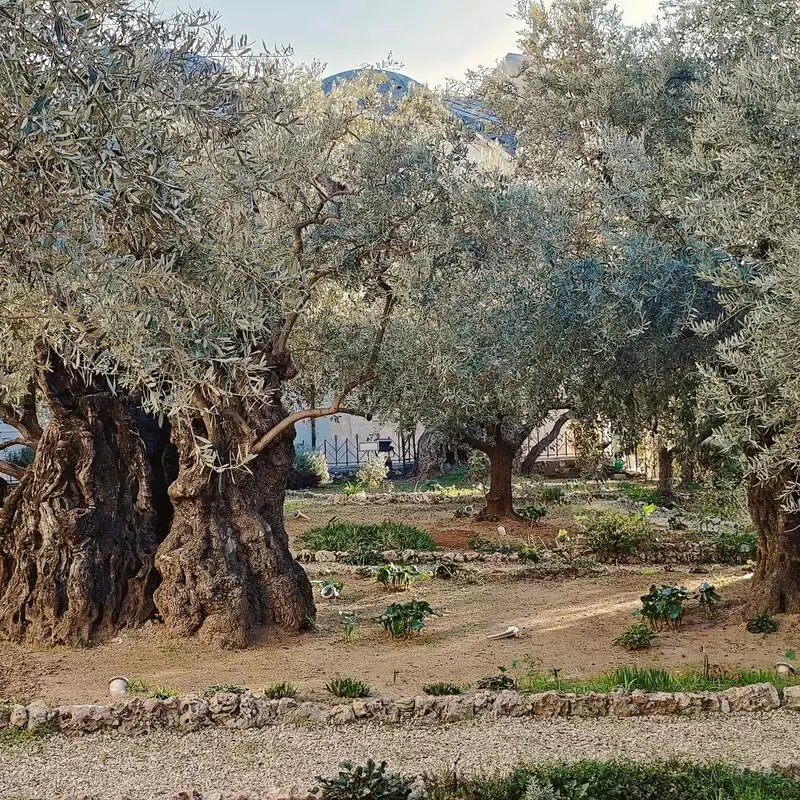 Gethsemane
Gethsemane
Jerusalem

Jerusalem
4. Western Wall
A trip to the Wailing Wall in Jerusalem is an incredible experience unlike any other. This ancient limestone wall, held in high esteem as Judaism's holiest place of prayer, has stood still for centuries, bearing human hopes and tears. Immerse yourself in history, enjoy the mesmerizing view of the sunrise, leave a small note in the crevices of the wall, and absorb the spiritual aura that permeates this timeless landmark. Nearby, the captivating Dome of the Rock and Al-Aqsa Mosque offer further opportunities for exploration.
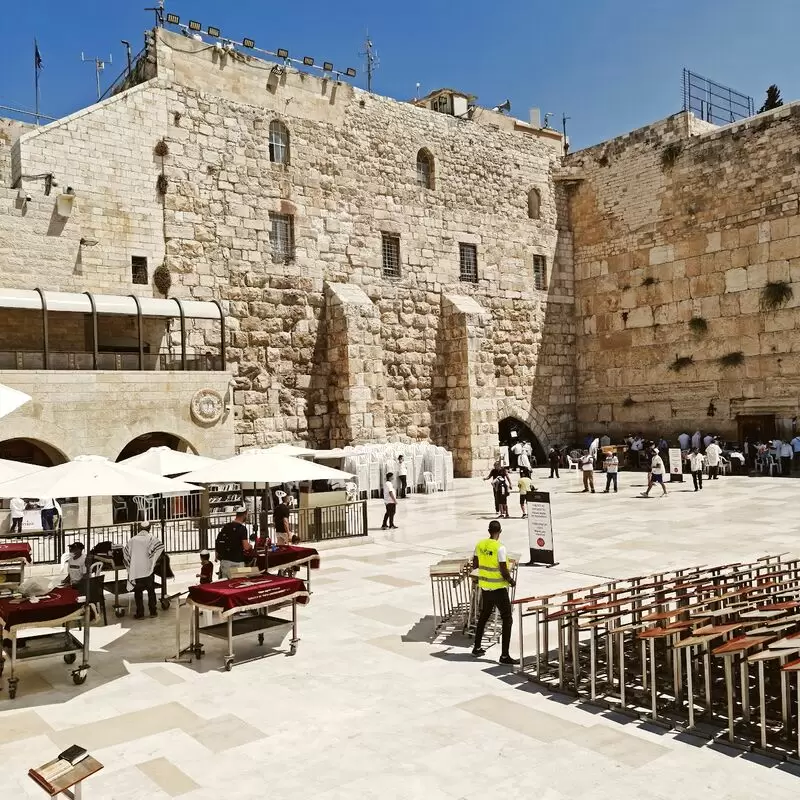 Western Wall
Western Wall
Jerusalem
Monday - Sunday: Open 24 hours

Jerusalem
5. Yad Vashem
A visit to Yad Vashem is an enriching experience that will move and teach you. It is Israel's official memorial to the victims of the Holocaust, illustrating the history before, during and after that cruel time. Little known is that many trees in this hill complex were planted in honor of the "Righteous Among the Nations," the non-Jews who risked their lives to protect Jews during the Holocaust. Nearby, it is worth visiting the picturesque Ein Karem neighborhood, known for its beautiful alleys, boutique cafes and historic churches.
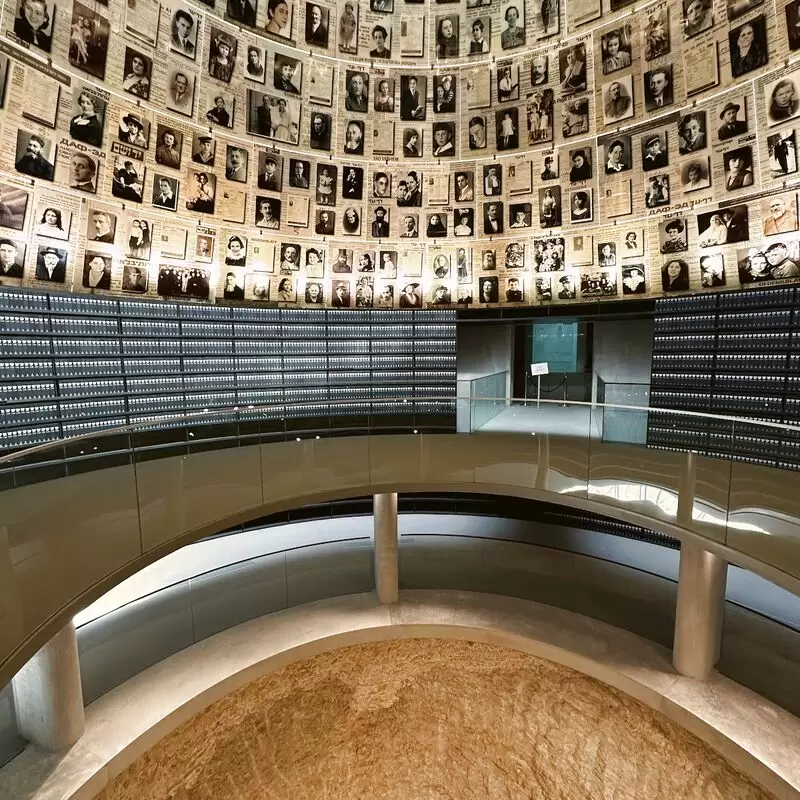 Yad Vashem
Yad Vashem
Jerusalem
Monday - Sunday: 8:30 AM – 5:00 PM
Friday: 8:30 AM – 2:00 PM
Saturday: Closed

Jerusalem
Friday: 8:30 AM – 2:00 PM
Saturday: Closed
6. Tower of David
Immerse yourself in the incomparable history of Jerusalem's legendary Tower of David. This ancient citadel, around which many biblical stories entwine, offers an enchanting journey through 4000 years. Marvel at the breathtaking panoramic view of the Old City from the top of the tower. Don't miss the fascinating archaeological finds and the magical nighttime light show. Pro-tip: For photography enthusiasts, it's a sunset paradise. Just a short walk away is the famous Jaffa Gate, which frames the historic splendor of Jerusalem.
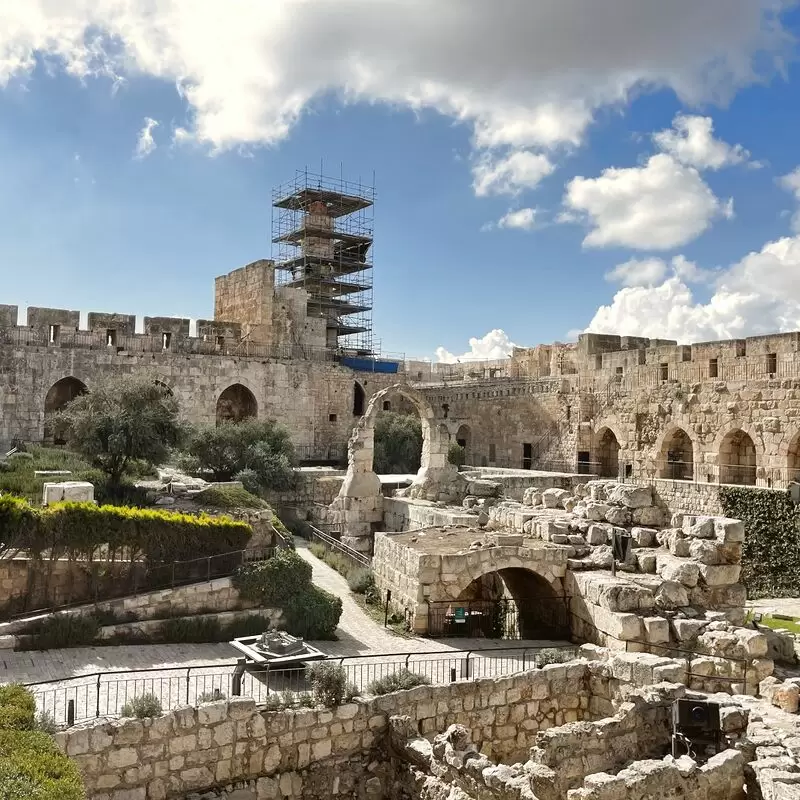 Tower of David
Tower of David
Jerusalem
Monday - Sunday: 9:00 AM – 4:00 PM
Friday: 9:00 AM – 2:00 PM

Jerusalem
Friday: 9:00 AM – 2:00 PM
7. City of David
Visiting the City of David in Jerusalem is like traveling back in time, right into history. It is the place where Jerusalem was born and offers an incomparable historical and spiritual journey. During your explorations you will discover ancient ruins from the time of King David, underground tunnels and the Pool of Siloam. An insider tip: Don't miss the Hezekiah Tunnel - the 1,500-foot-long, hand-dug waterway. Just a stone's throw away is the Wailing Wall, another must-see attraction in Jerusalem.
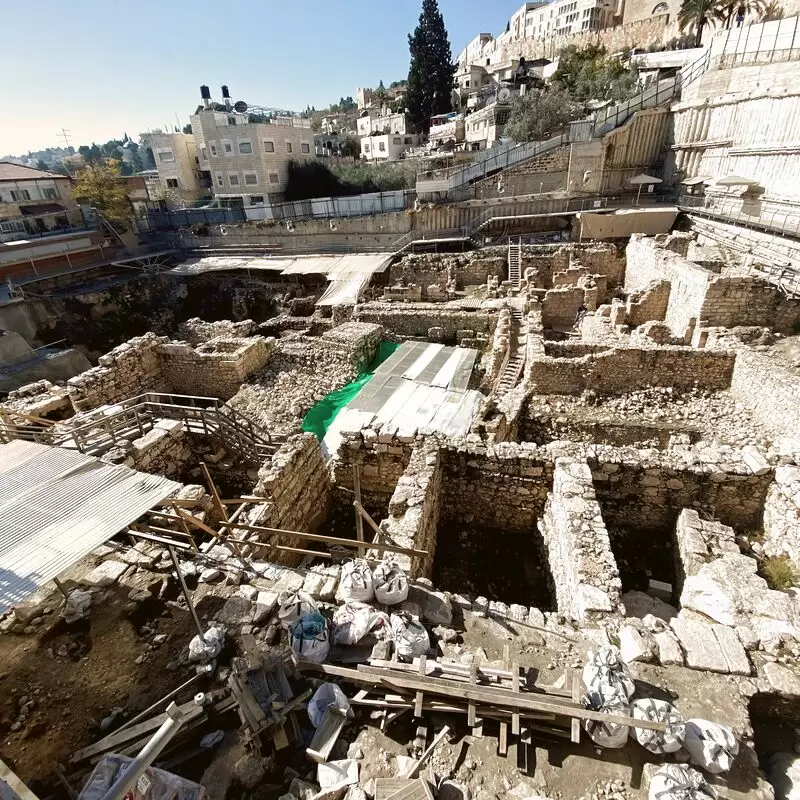 City of David
City of David
Ma'alot Ir David St 17, Jerusalem
Monday - Sunday: 8:00 AM – 7:00 PM, 8:15 – 9:45 PM
Friday: 8:00 AM – 4:00 PM
Saturday: Closed

Ma'alot Ir David St 17, Jerusalem
Friday: 8:00 AM – 4:00 PM
Saturday: Closed
8. Dome of the Rock
The Dome of the Rock in Jerusalem, with its stunning Islamic architecture and beautiful gilded dome that gives the monument its name, is a must-see. Enjoy the spiritual atmosphere of this iconic shrine, significant to Islam, Christianity and Judaism. It is surrounded by a series of stone-paved courtyards, themselves sacred sites. Located in the heart of Old Jerusalem, the site is a short walk from the Wailing Wall and Al-Aqsa Mosque. Experience the harmony of history, faith and art united in one place.
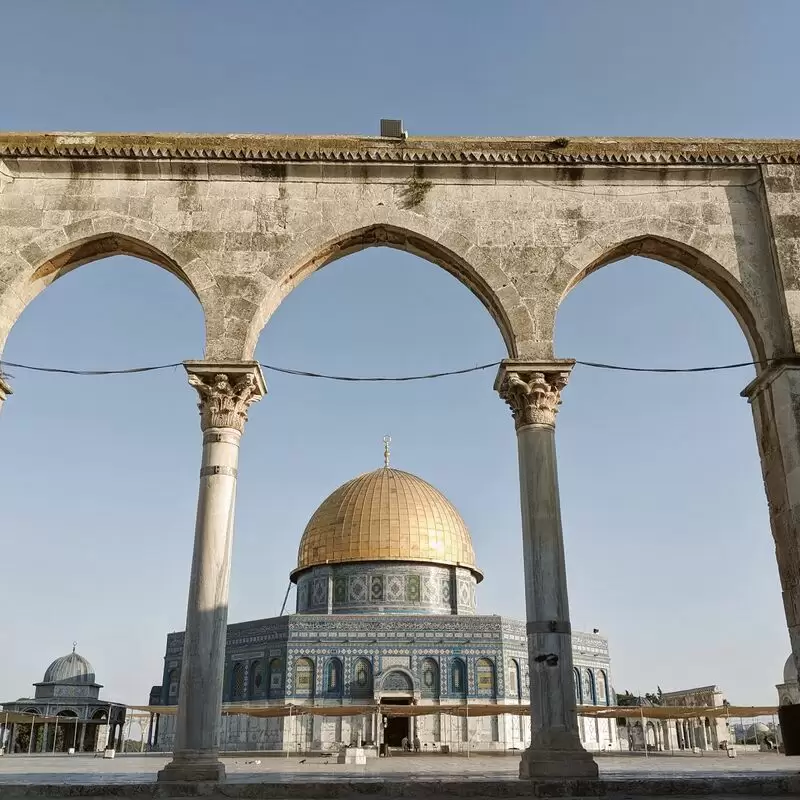 Dome of the Rock
Dome of the Rock
Jerusalem

Jerusalem
9. Zion Gate
The Zion Gate, one of the seven entrances to Jerusalem's Old City, is imbued with a fascinating allure. It bears dramatic battle scars from the 1948 Arab-Israeli War - a testament to the city's turbulent history. Just a short walk away is the somber yet soothing "Room of the Last Supper," considered the site of Jesus' final meal. You can literally feel the historical excitement and sense of ancient wonder contained within these venerable stones!
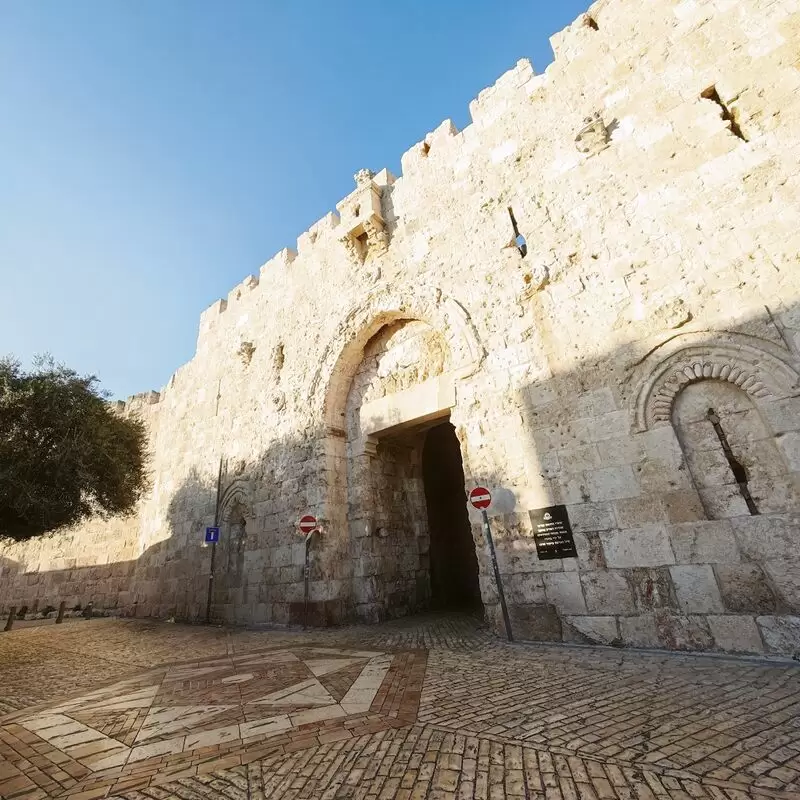 Zion Gate
Zion Gate
Jerusalem

Jerusalem
10. The Jerusalem Botanical Gardens
Explore the lush greenery of the Jerusalem Botanical Garden, home to over 6,000 species of plants from around the world. This horticultural oasis offers a peaceful retreat from the hustle and bustle of the city, making it suitable for nature lovers and the curious alike. Don't miss the tropical greenhouse, known for its exotic orchids and carnivorous plants. Just a stone's throw away, you can also visit the adjacent Israel Museum, which exhibits archaeological finds and cultural artworks of the country.
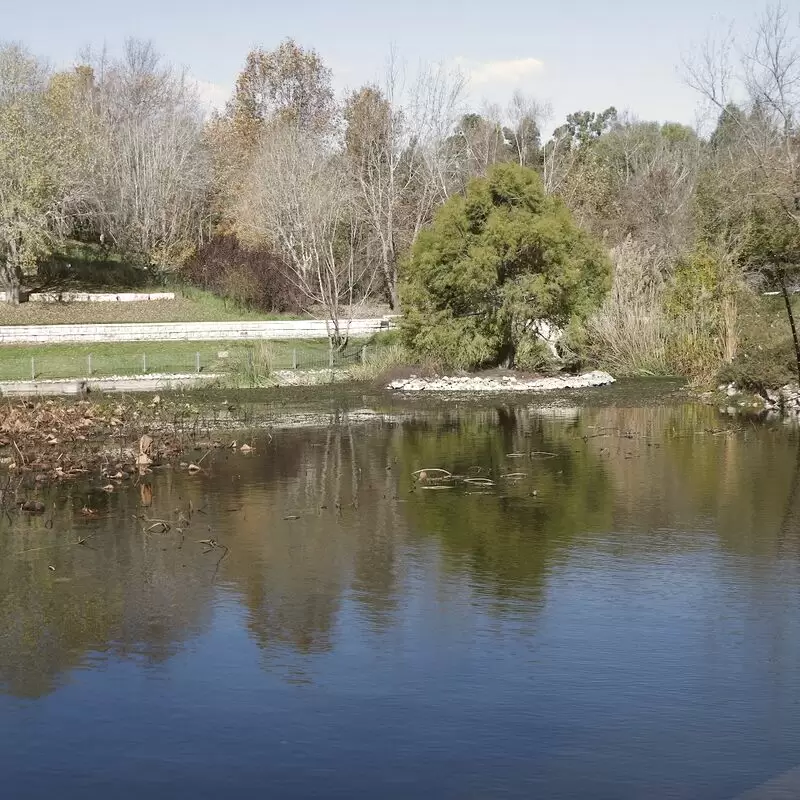 The Jerusalem Botanical Gardens
The Jerusalem Botanical Gardens
הגן הבוטני, זלמן שניאור 1, Jerusalem
Monday - Sunday: 9:00 AM – 5:00 PM
Friday: 9:00 AM – 3:00 PM

הגן הבוטני, זלמן שניאור 1, Jerusalem
Friday: 9:00 AM – 3:00 PM
11. Damascus Gate
Visit the Damascus Gate, one of Jerusalem's most remarkable and busy entrances. Dating back to Ottoman rule, this imposing stone fortress is decorated with intricate carvings and reveals centuries of history - a delightful spectacle for history buffs. Enjoy the vibrant mix of cultures at the nearby market, filled with tantalizing aromas of spices and fresh Middle Eastern produce. The famous Church of the Holy Sepulchre is also just a short walk away, perfect for deepening your historical explorations.
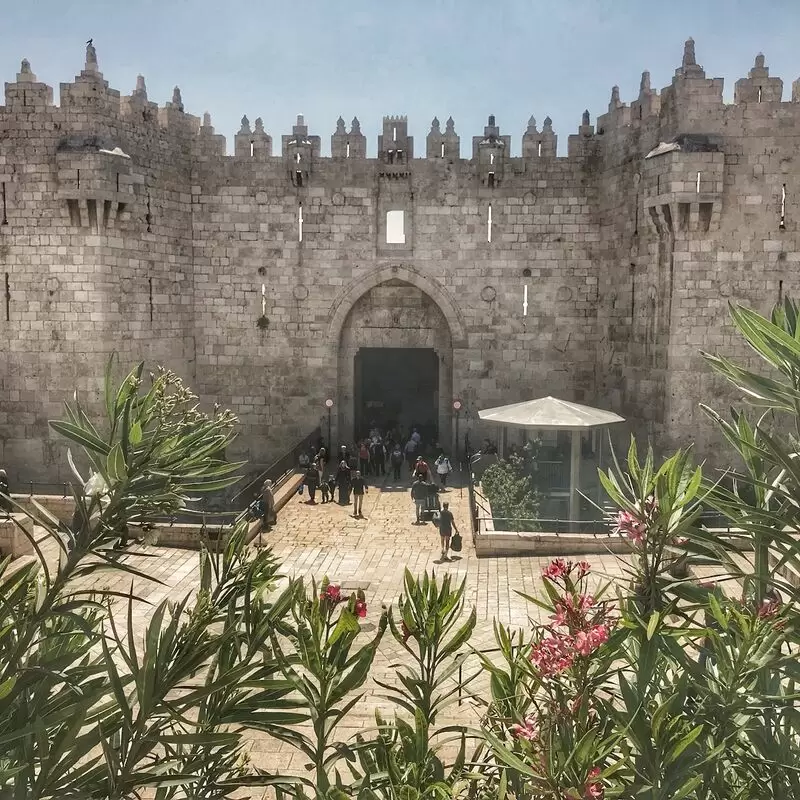 Damascus Gate
Damascus Gate
Jerusalem

Jerusalem
12. Saint Peter in Gallicantu
Make your way to "Saint Peter in Gallicantu," a place steeped in biblical history. This impressive Catholic church on the eastern slope of Mount Zion is believed to be the place where Jesus was held captive overnight. The name "Gallicantu" translates to "cockcrow" and commemorates Peter's denial of Christ. Experience the ancient wonders with archaeological remains, including the Holy Stairs. Just a short walk away you will find the Room of the Last Supper, which will enrich your spiritual journey.
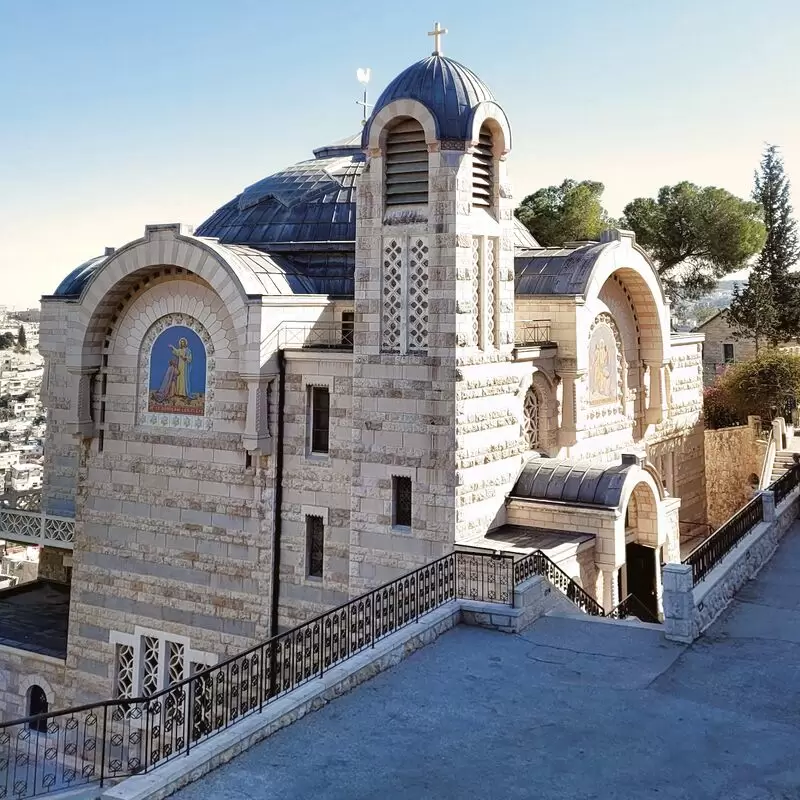 Saint Peter in Gallicantu
Saint Peter in Gallicantu
מלאכי השלום, Jerusalem

מלאכי השלום, Jerusalem
13. Lions' Gate
Embark on a pilgrimage to the Lion's Gate in Jerusalem, a gate with an impressive history. Marvel at the breathtaking architecture with the four lion statues created by Suleiman the Magnificent in 1538. Recall the epic visit of Pope Paul VI in 1964, an unprecedented event in modern religious history. Just a stone's throw away is the fascinating site of the Pool of Bethesda. Immerse yourself in the city's rich diversity of cultures, religion and history!
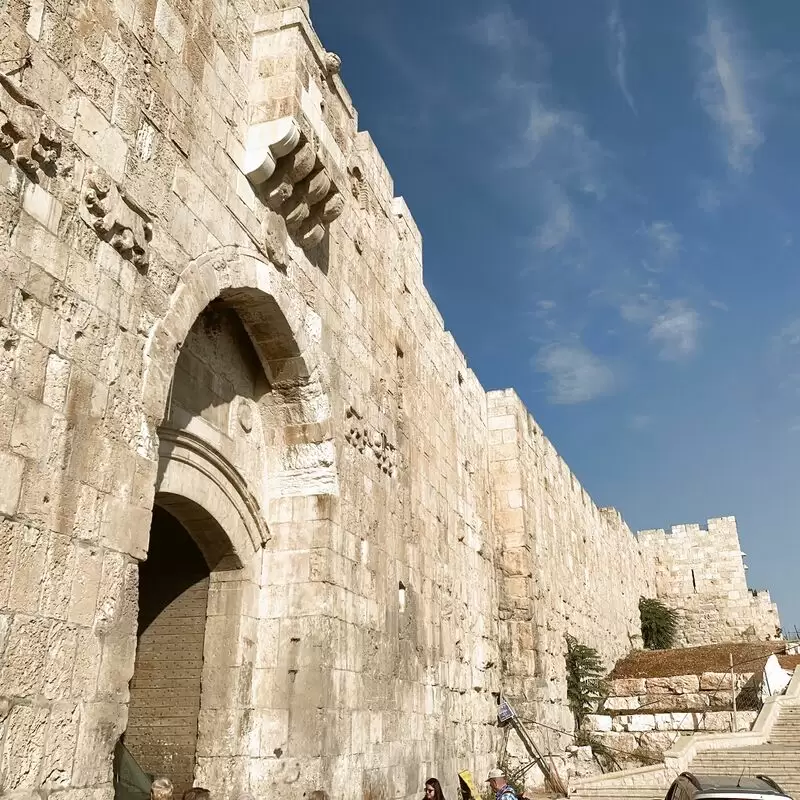 Lions' Gate
Lions' Gate
Lion's Gate St, Jerusalem

Lion's Gate St, Jerusalem
14. New Gate
If you are interested in history or architecture, you can't miss the New Gate in Jerusalem! It is the youngest gate in the Old City, built in 1889, symbolizing a connection between old and new. You will be fascinated by its neo-Gothic style, which is rare in Israel. Even more, it was originally built for Christians' access to the Holy Sepulcher! And the best is yet to come: just a short walk away is the Alexander Nevsky Church, a hidden gem full of history!
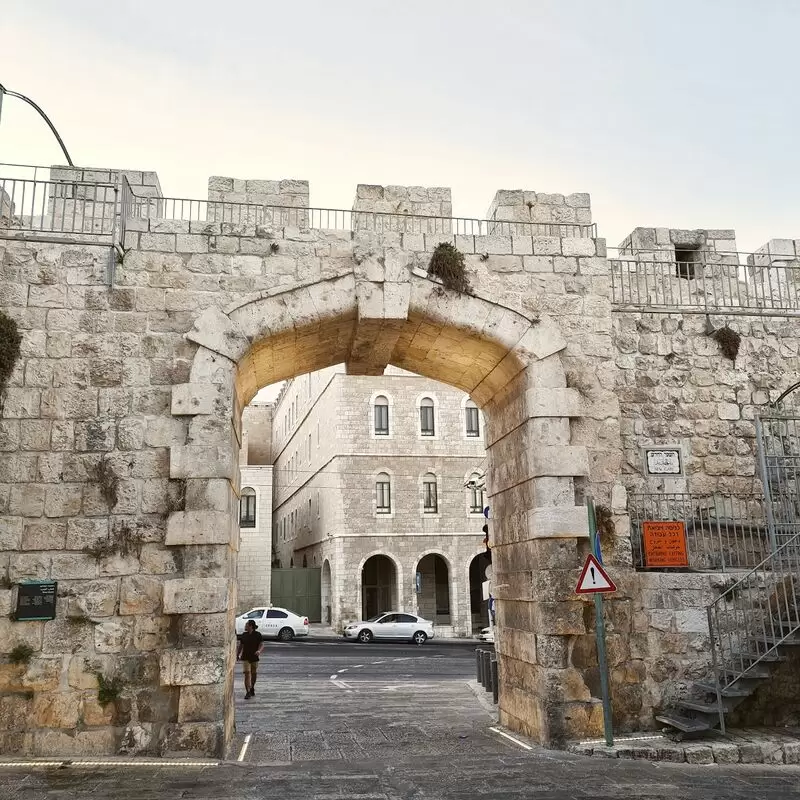 New Gate
New Gate
Jerusalem
Monday - Sunday: Open 24 hours

Jerusalem
15. St. Anne's Church Jerusalem
St. Anne's Church, an impressive example of Romanesque architecture, is an oasis of calm amid the hustle and bustle of Jerusalem. It is considered the birthplace of the Virgin Mary and adds a spiritual dimension to your trip. The enchanting acoustics make visitors spontaneously sing. Enjoy the tranquil atmosphere in the lush gardens. Don't miss the adjacent Ponds of Bethesda, a testament to the miraculous healing powers of Jesus. An intimate encounter with sacred history awaits you.
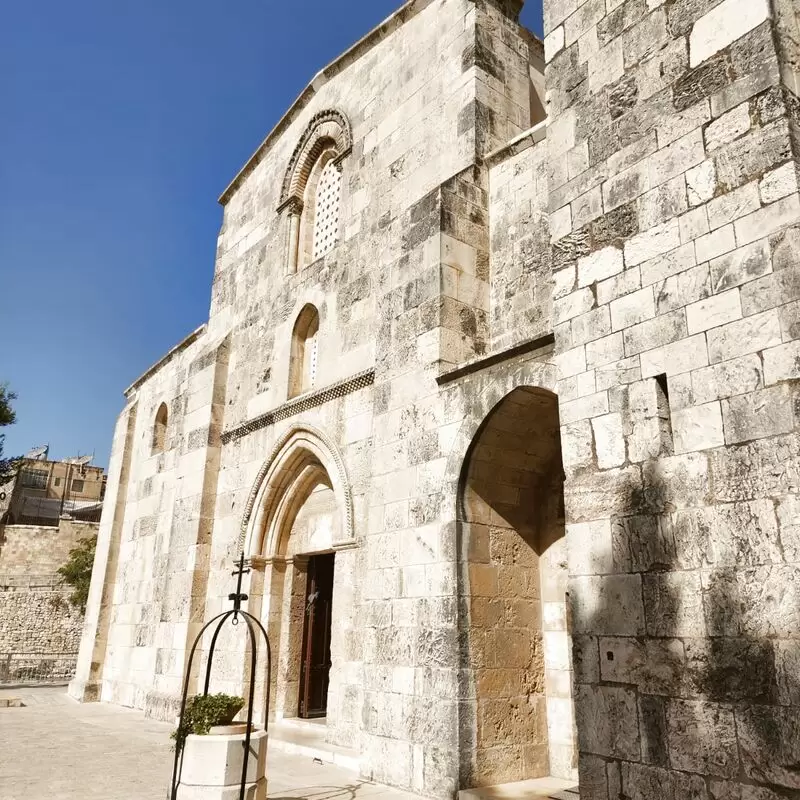 St. Anne's Church Jerusalem
St. Anne's Church Jerusalem
Jerusalem

Jerusalem
16. Hurva Synagogue
The Hurva Synagogue, an incredible testament to perseverance and faith in the Jewish Quarter of Jerusalem's Old City, will captivate you. The Hurva Synagogue's history is one of destruction and reconstruction, with each repetition testifying to passionate devotion. Stand beneath the great ark, admire the ornate decorations and feel the spiritual energy that permeates this historic site. Don't miss the panoramic view of Jerusalem from its balcony. Explore the surrounding sights, such as the Wailing Wall and the Cardo, which will immerse you even deeper into the city's history.
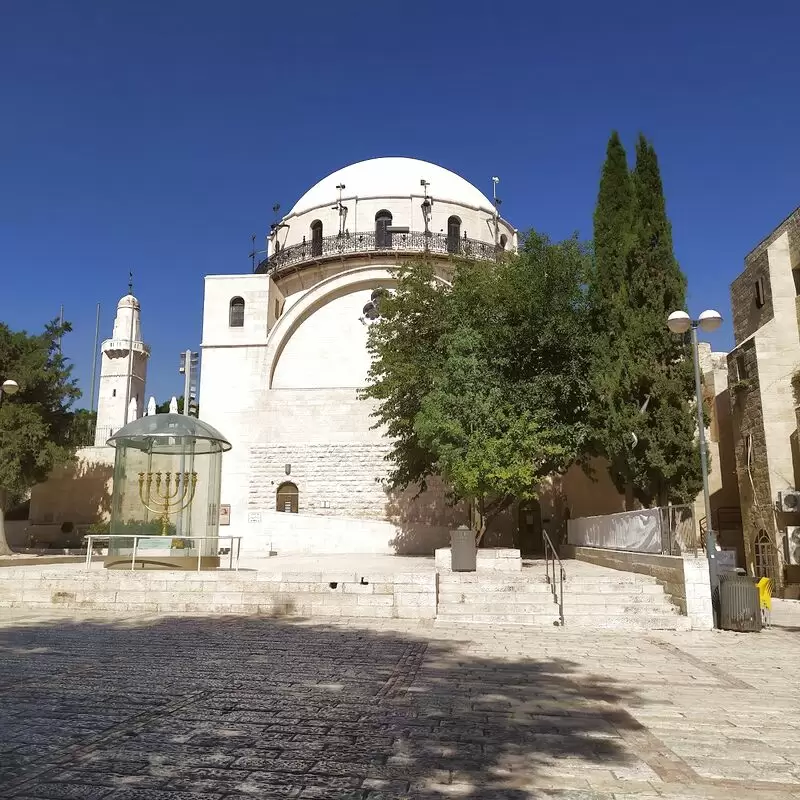 Hurva Synagogue
Hurva Synagogue
Jerusalem
Monday - Sunday: 9:00 AM – 5:00 PM
Friday - Saturday: Closed

Jerusalem
Friday - Saturday: Closed
Best Time to Visit Jerusalem
The best time to visit Jerusalem, Israel, is from April to May and October to November. These months offer mild weather, fewer crowds, and lower prices. In spring, the city is in full bloom, while in fall, temperatures are pleasant - both ideal times for sightseeing. However, pay attention to the calendar of Jewish holidays, as some attractions may be closed.
Annual Weather in Jerusalem
January
Jan
46 / 62 °F
8 / 16 °C
1
4
82
February
Feb
47 / 65 °F
8 / 18 °C
1
4
76
March
Mar
50 / 73 °F
10 / 23 °C
0
3
99
April
Apr
56 / 81 °F
14 / 27 °C
0
1
103
May
May
64 / 86 °F
18 / 30 °C
0
1
114
June
Jun
68 / 90 °F
20 / 32 °C
0
0
118
July
Jul
71 / 92 °F
22 / 34 °C
0
0
123
August
Aug
72 / 94 °F
22 / 34 °C
0
0
124
September
Sep
70 / 92 °F
21 / 33 °C
0
0
117
October
Oct
65 / 83 °F
19 / 29 °C
0
1
112
November
Nov
57 / 76 °F
14 / 24 °C
0
3
92
December
Dec
50 / 66 °F
10 / 19 °C
0
3
91
Questions & Answers
Is it safe to travel in Jerusalem?
Yes, Jerusalem is generally safe for travelers. As in any populous city, it is advisable to take safety precautions, such as avoiding less crowded areas at night and being careful with personal belongings. Local authorities prioritize security in areas popular with tourists. However, due to Jerusalem's unique political situation, visitors should keep abreast of current events and advisories. It is always recommended to have travel insurance for unforeseen events.
What do I need to know about Jerusalem's religious customs?
Jerusalem has great religious significance for Judaism, Christianity and Islam. It is considered respectful to dress modestly, especially at religious sites. Visitors should also be prepared to go through security checks when entering these sites. During Shabbat, most Jewish institutions are closed from Friday evening to Saturday evening. During Muslim prayer times, non-Muslims may not be permitted to enter certain Islamic sites. Local customs and traditions are expected to be respected to ensure a harmonious experience for all.
Do I need a visa to visit Jerusalem?
Whether you need a visa to visit Jerusalem, Israel, depends largely on your nationality. Citizens of many countries, including the United States, Canada, the United Kingdom, the EU, Australia, New Zealand, Japan, and South Korea, can visit Israel for tourist purposes for up to 90 days without a visa. However, citizens from other countries may require a visa. We recommend that you check with the Israeli Embassy or Consulate in your home country for specific information.
How do I get around the city?
The city of Jerusalem, Israel, is easy to explore by public transportation. Take advantage of Jerusalem's streetcar system, which runs through many of the city's main sites. Get a Rav Kav chip card, which allows you to easily pay fares on streetcars and buses. Remember that public transportation is essentially at a standstill on the Sabbath (Friday evening through Saturday evening). Alternatively, cabs are available, and the city is also easy to explore on foot, especially the narrow streets of the Old City.
Where can I find local food?
If you are looking for an authentic culinary experience in Jerusalem, Israel, you should visit the Mahane Yehuda Market. This bustling place is the city's culinary hotspot and is home to numerous food stalls, stores and restaurants. Here you can discover a variety of traditional Israeli dishes such as falafel, shawarma, hummus and freshly baked challah. Don't miss Hanna's baba ganoush or the marzipan rugelach at the Marzipan Bakery, which are a sweet treat! When it comes to local cuisine, Mahane Yehuda represents Jerusalem's diverse food culture.
How can I politely interact with locals?
When traveling in Jerusalem, be sure to remember that this city is a sacred and important place for many religions. Always be respectful and sensitive to local customs and religious practices. Speak politely and avoid controversial topics related to politics or religion. Try to learn a few basic Hebrew phrases to facilitate positive interaction. Remember to dress modestly, especially when visiting religious sites, as this is considered a sign of respect. Understanding and following these guidelines will make your visit to Jerusalem a positive experience.
Do people speak English in Jerusalem?
Yes, many people in Jerusalem can speak English. Although Hebrew and Arabic are the official languages of Israel, English is taught as a second language in schools and is widely spoken. Communication for English-speaking tourists is generally not a problem, as signs and menus are often in English as well. However, knowing a few basic phrases in Hebrew or Arabic can improve your experience.
Which currency is used in Jerusalem?
The official currency in Jerusalem, Israel, is the Israeli New Shekel, also known as NIS. Its symbol is ₪ and it consists of 100 agorot. Coins come in denominations of 10 agorot, ½ shekel, 1 shekel, 2 shekels, 5 shekels, and 10 shekels, and banknotes come in 20, 50, 100, and 200 shekels. Credit cards are accepted in most stores.
Where can I find public restrooms?
As a tourist guide in Jerusalem, Israel, I can tell you that public toilets are not as common as in other cities. However, you will find facilities in public places such as parks, government buildings and bus stations. There are also often restrooms in shopping malls and large department stores. If you visit the Old City, you will find restrooms near the Western Wall and the Church of the Holy Sepulcher. Larger restaurants and cafes usually have restrooms for their patrons as well.
How can I dress respectfully in Jerusalem?
When visiting Jerusalem, it is important to dress respectfully, as the city is significant for various religions. Both men and women should keep their shoulders and knees covered, especially at religious sites. Because of the heat, it is advisable to wear loose-fitting clothing. Women should wear a light scarf to cover their heads in certain religious sites. Always remember that it is better to be safe than sorry and to respect local customs and traditions.
Can I drink tap water in Jerusalem?
Yes, the tap water in Jerusalem is generally safe to drink. The water undergoes rigorous testing to meet the quality standards set by the country's Ministry of Health. However, the taste and composition may differ from what you are used to. Some travelers also prefer filtered or bottled water to stay healthy during their trip. In general, it is advisable to drink plenty of fluids, especially during the hot summer months.
What's the emergency number in Jerusalem?
In Jerusalem, Israel, emergency numbers are similar to many other places around the world. For general emergencies, you can dial 100 to reach the police. For medical emergencies, dial 101 for Magen David Adom, Israel's national emergency medical service. For fire emergencies, dial 102 to reach the fire department. These services are available around the clock. It is important to dial these numbers only in real emergencies to maximize availability for people in need.
Are credit cards widely accepted here?
Yes, credit cards are widely accepted in Jerusalem, Israel. You can use them at most restaurants, hotels and stores. However, for smaller establishments, food markets or street vendors, it is a good idea to have some local currency on hand. Also note that some stores may charge an additional fee for credit card transactions. So it's a good idea to ask beforehand to avoid unexpected fees.
Is it customary to tip in Jerusalem?
Yes, tipping is common in Jerusalem and in much of Israel. It is customary to tip waiters in restaurants 10-15% of the bill. Cab drivers generally do not expect a tip, but it is appreciated if you round up to the nearest shekel. For services such as beauty salons and hotel staff, a small tip is encouraged but not required. However, always consider the quality of the service before tipping. Also, check your bills, as some establishments automatically include a service charge.
What are crucial Hebrew phrases I should learn?
As you make your way through Jerusalem, knowing basic Hebrew phrases can be helpful. 'Shalom' is a universal greeting for 'hello' or 'goodbye'. Express your gratitude with 'Toda'. When you need help, ask "Efshar l'azor?" or "Can you help?". When shopping or ordering, "Kama ze oleh?" means "How much does this cost?". To say "please" or "excuse me," use "bevakasha." Always remember 'slicha' for 'excuse me'. Eifo ha sherutim?" can save your day when you are looking for a toilet. Understanding these terms can improve your experience in Jerusalem.
How's the public transportation system?
Jerusalem has an efficient and diverse public transportation system. At the heart of this system is the light rail system, which snakes across the city and connects various neighborhoods. In addition, the city has an extensive network of buses operated by several companies. Cabs and shared cabs ('sherut') are also widely available. It is easy to travel between different places, whether you are in the old city or further out. However, buses and the light rail do not operate on Shabbat (Friday evening to Saturday evening).
Are there taxis available all the time?
Yes, cabs are available 24 hours a day in Jerusalem. You can find them at designated cab stations or can be hailed directly on the street. Many cabs also offer a call service for added convenience. It is advisable to make sure the driver uses the meter or to negotiate the fare before the trip, especially late at night. Taking a cab can be an efficient and convenient way to get around the city and reach your destination.
Is there internet access throughout the city?
Yes, Jerusalem offers extensive Internet access. Many hotels, cafes and restaurants offer free Wi-Fi, and some public areas such as Kikar Safra and parks also have free public Wi-Fi zones. For uninterrupted connectivity, visitors can also use mobile data by renting a local SIM card or using international roaming services. Internet cafes are also available for access. However, Internet use may be restricted or discouraged in certain religious areas.
How reliable is the healthcare service for tourists?
Israel, including Jerusalem, has an excellent health care system that is easily accessible to tourists. Hospitals are equipped with modern facilities, and there are clinics throughout the city for emergencies and routine checkups. English-speaking staff is commonplace. However, it is recommended to have comprehensive travel insurance, as medical treatment can be expensive and the National Health Service does not cover foreign visitors. Pharmacies are also efficient and available throughout Jerusalem.
How expensive is Jerusalem compared to other cities?
Jerusalem is considered medium to expensive compared to other cities around the world. The cost of accommodation, food and tourist attractions can be quite high. However, there are a variety of options to suit different budgets. Prices for basic services are comparable to those in Western European or North American cities. If you plan prudently, it is possible to have an affordable trip, but in general, be prepared for higher expenses when visiting Jerusalem.
Any unique local customs that I should be aware of?
In Jerusalem, modest dress is highly respected, especially at religious sites such as the Wailing Wall. Most local Jerusalemites avoid doing business or driving on Shabbat, which begins on Friday evening and lasts until Saturday evening. Greetings such as "shalom" (peace) and "toda raba" (thank you very much) are common. Finally, haggling is common in Jerusalem's markets, so feel free to negotiate the price.
Where can I find vegetarian or vegan food?
There are many establishments in Jerusalem that offer vegetarian or vegan cuisine. One popular place is Adom, where the culinary focus is on Mediterranean dishes with vegan options. Tmol Shilshom is a bookstore cafe known for its vegetarian dishes. Village Green serves a variety of organic vegan dishes. Another establishment is the well-regarded vegan restaurant Nisnas, which specializes in local Israeli and Middle Eastern dishes.
Are there quiet places to relax within the city?
Of course, Jerusalem offers many quiet places to relax in its lively landscape. One such place is the Wohl Rose Garden, a quiet place with lots of greenery, beautiful flowers and peaceful paths. The Garden of Gethsemane is another quiet and contemplative place with ancient olive trees. First Station, a converted old train station, is a quiet place with restaurants and stores to relax. Finally, the Jerusalem Botanical Garden offers an escape into nature with its diverse plant life.
What's the driving rule in Jerusalem?
When driving in Jerusalem, one must adhere to right-hand traffic, which is standard in Israel. This means that vehicles are driven on the right side of the road and overtaking is usually done on the left. Wearing seat belts is mandatory, both on the front and rear seats. Most road signs are in Hebrew, Arabic and English. Driving under the influence of alcohol is illegal and punished severely. An international driver's license is essential for non-residents.
Can I find city maps easily?
Yes, city maps of Jerusalem are easy to find. They are available in many places, such as tourist information centers, hotels, airport counters, and major tourist destinations. In addition, digital maps are available on numerous internet platforms and mobile apps, making navigation easier and even providing additional information about various attractions and activities. Make sure you have a map to enhance your travel experience in Jerusalem.
Feedback
I hope you found this article informative and helpful. I'm eager to improve the content and make it even more valuable for you. If you have any feedback or suggestions, I would love to hear from you.
Do you have any tips or hidden gems that you think should be added to the list? Are there any areas that you feel could use more explanation or clarification?
Your input is greatly appreciated and will help us to continue providing high-quality content that meets your needs and interests. Please feel free to share your thoughts.
Is it safe to travel in Jerusalem?
Yes, Jerusalem is generally safe for travelers. As in any populous city, it is advisable to take safety precautions, such as avoiding less crowded areas at night and being careful with personal belongings. Local authorities prioritize security in areas popular with tourists. However, due to Jerusalem's unique political situation, visitors should keep abreast of current events and advisories. It is always recommended to have travel insurance for unforeseen events.
What do I need to know about Jerusalem's religious customs?
Jerusalem has great religious significance for Judaism, Christianity and Islam. It is considered respectful to dress modestly, especially at religious sites. Visitors should also be prepared to go through security checks when entering these sites. During Shabbat, most Jewish institutions are closed from Friday evening to Saturday evening. During Muslim prayer times, non-Muslims may not be permitted to enter certain Islamic sites. Local customs and traditions are expected to be respected to ensure a harmonious experience for all.
Do I need a visa to visit Jerusalem?
Whether you need a visa to visit Jerusalem, Israel, depends largely on your nationality. Citizens of many countries, including the United States, Canada, the United Kingdom, the EU, Australia, New Zealand, Japan, and South Korea, can visit Israel for tourist purposes for up to 90 days without a visa. However, citizens from other countries may require a visa. We recommend that you check with the Israeli Embassy or Consulate in your home country for specific information.
How do I get around the city?
The city of Jerusalem, Israel, is easy to explore by public transportation. Take advantage of Jerusalem's streetcar system, which runs through many of the city's main sites. Get a Rav Kav chip card, which allows you to easily pay fares on streetcars and buses. Remember that public transportation is essentially at a standstill on the Sabbath (Friday evening through Saturday evening). Alternatively, cabs are available, and the city is also easy to explore on foot, especially the narrow streets of the Old City.
Where can I find local food?
If you are looking for an authentic culinary experience in Jerusalem, Israel, you should visit the Mahane Yehuda Market. This bustling place is the city's culinary hotspot and is home to numerous food stalls, stores and restaurants. Here you can discover a variety of traditional Israeli dishes such as falafel, shawarma, hummus and freshly baked challah. Don't miss Hanna's baba ganoush or the marzipan rugelach at the Marzipan Bakery, which are a sweet treat! When it comes to local cuisine, Mahane Yehuda represents Jerusalem's diverse food culture.
How can I politely interact with locals?
When traveling in Jerusalem, be sure to remember that this city is a sacred and important place for many religions. Always be respectful and sensitive to local customs and religious practices. Speak politely and avoid controversial topics related to politics or religion. Try to learn a few basic Hebrew phrases to facilitate positive interaction. Remember to dress modestly, especially when visiting religious sites, as this is considered a sign of respect. Understanding and following these guidelines will make your visit to Jerusalem a positive experience.
Do people speak English in Jerusalem?
Yes, many people in Jerusalem can speak English. Although Hebrew and Arabic are the official languages of Israel, English is taught as a second language in schools and is widely spoken. Communication for English-speaking tourists is generally not a problem, as signs and menus are often in English as well. However, knowing a few basic phrases in Hebrew or Arabic can improve your experience.
Which currency is used in Jerusalem?
The official currency in Jerusalem, Israel, is the Israeli New Shekel, also known as NIS. Its symbol is ₪ and it consists of 100 agorot. Coins come in denominations of 10 agorot, ½ shekel, 1 shekel, 2 shekels, 5 shekels, and 10 shekels, and banknotes come in 20, 50, 100, and 200 shekels. Credit cards are accepted in most stores.
Where can I find public restrooms?
As a tourist guide in Jerusalem, Israel, I can tell you that public toilets are not as common as in other cities. However, you will find facilities in public places such as parks, government buildings and bus stations. There are also often restrooms in shopping malls and large department stores. If you visit the Old City, you will find restrooms near the Western Wall and the Church of the Holy Sepulcher. Larger restaurants and cafes usually have restrooms for their patrons as well.
How can I dress respectfully in Jerusalem?
When visiting Jerusalem, it is important to dress respectfully, as the city is significant for various religions. Both men and women should keep their shoulders and knees covered, especially at religious sites. Because of the heat, it is advisable to wear loose-fitting clothing. Women should wear a light scarf to cover their heads in certain religious sites. Always remember that it is better to be safe than sorry and to respect local customs and traditions.
Can I drink tap water in Jerusalem?
Yes, the tap water in Jerusalem is generally safe to drink. The water undergoes rigorous testing to meet the quality standards set by the country's Ministry of Health. However, the taste and composition may differ from what you are used to. Some travelers also prefer filtered or bottled water to stay healthy during their trip. In general, it is advisable to drink plenty of fluids, especially during the hot summer months.
What's the emergency number in Jerusalem?
In Jerusalem, Israel, emergency numbers are similar to many other places around the world. For general emergencies, you can dial 100 to reach the police. For medical emergencies, dial 101 for Magen David Adom, Israel's national emergency medical service. For fire emergencies, dial 102 to reach the fire department. These services are available around the clock. It is important to dial these numbers only in real emergencies to maximize availability for people in need.
Are credit cards widely accepted here?
Yes, credit cards are widely accepted in Jerusalem, Israel. You can use them at most restaurants, hotels and stores. However, for smaller establishments, food markets or street vendors, it is a good idea to have some local currency on hand. Also note that some stores may charge an additional fee for credit card transactions. So it's a good idea to ask beforehand to avoid unexpected fees.
Is it customary to tip in Jerusalem?
Yes, tipping is common in Jerusalem and in much of Israel. It is customary to tip waiters in restaurants 10-15% of the bill. Cab drivers generally do not expect a tip, but it is appreciated if you round up to the nearest shekel. For services such as beauty salons and hotel staff, a small tip is encouraged but not required. However, always consider the quality of the service before tipping. Also, check your bills, as some establishments automatically include a service charge.
What are crucial Hebrew phrases I should learn?
As you make your way through Jerusalem, knowing basic Hebrew phrases can be helpful. 'Shalom' is a universal greeting for 'hello' or 'goodbye'. Express your gratitude with 'Toda'. When you need help, ask "Efshar l'azor?" or "Can you help?". When shopping or ordering, "Kama ze oleh?" means "How much does this cost?". To say "please" or "excuse me," use "bevakasha." Always remember 'slicha' for 'excuse me'. Eifo ha sherutim?" can save your day when you are looking for a toilet. Understanding these terms can improve your experience in Jerusalem.
How's the public transportation system?
Jerusalem has an efficient and diverse public transportation system. At the heart of this system is the light rail system, which snakes across the city and connects various neighborhoods. In addition, the city has an extensive network of buses operated by several companies. Cabs and shared cabs ('sherut') are also widely available. It is easy to travel between different places, whether you are in the old city or further out. However, buses and the light rail do not operate on Shabbat (Friday evening to Saturday evening).
Are there taxis available all the time?
Yes, cabs are available 24 hours a day in Jerusalem. You can find them at designated cab stations or can be hailed directly on the street. Many cabs also offer a call service for added convenience. It is advisable to make sure the driver uses the meter or to negotiate the fare before the trip, especially late at night. Taking a cab can be an efficient and convenient way to get around the city and reach your destination.
Is there internet access throughout the city?
Yes, Jerusalem offers extensive Internet access. Many hotels, cafes and restaurants offer free Wi-Fi, and some public areas such as Kikar Safra and parks also have free public Wi-Fi zones. For uninterrupted connectivity, visitors can also use mobile data by renting a local SIM card or using international roaming services. Internet cafes are also available for access. However, Internet use may be restricted or discouraged in certain religious areas.
How reliable is the healthcare service for tourists?
Israel, including Jerusalem, has an excellent health care system that is easily accessible to tourists. Hospitals are equipped with modern facilities, and there are clinics throughout the city for emergencies and routine checkups. English-speaking staff is commonplace. However, it is recommended to have comprehensive travel insurance, as medical treatment can be expensive and the National Health Service does not cover foreign visitors. Pharmacies are also efficient and available throughout Jerusalem.
How expensive is Jerusalem compared to other cities?
Jerusalem is considered medium to expensive compared to other cities around the world. The cost of accommodation, food and tourist attractions can be quite high. However, there are a variety of options to suit different budgets. Prices for basic services are comparable to those in Western European or North American cities. If you plan prudently, it is possible to have an affordable trip, but in general, be prepared for higher expenses when visiting Jerusalem.
Any unique local customs that I should be aware of?
In Jerusalem, modest dress is highly respected, especially at religious sites such as the Wailing Wall. Most local Jerusalemites avoid doing business or driving on Shabbat, which begins on Friday evening and lasts until Saturday evening. Greetings such as "shalom" (peace) and "toda raba" (thank you very much) are common. Finally, haggling is common in Jerusalem's markets, so feel free to negotiate the price.
Where can I find vegetarian or vegan food?
There are many establishments in Jerusalem that offer vegetarian or vegan cuisine. One popular place is Adom, where the culinary focus is on Mediterranean dishes with vegan options. Tmol Shilshom is a bookstore cafe known for its vegetarian dishes. Village Green serves a variety of organic vegan dishes. Another establishment is the well-regarded vegan restaurant Nisnas, which specializes in local Israeli and Middle Eastern dishes.
Are there quiet places to relax within the city?
Of course, Jerusalem offers many quiet places to relax in its lively landscape. One such place is the Wohl Rose Garden, a quiet place with lots of greenery, beautiful flowers and peaceful paths. The Garden of Gethsemane is another quiet and contemplative place with ancient olive trees. First Station, a converted old train station, is a quiet place with restaurants and stores to relax. Finally, the Jerusalem Botanical Garden offers an escape into nature with its diverse plant life.
What's the driving rule in Jerusalem?
When driving in Jerusalem, one must adhere to right-hand traffic, which is standard in Israel. This means that vehicles are driven on the right side of the road and overtaking is usually done on the left. Wearing seat belts is mandatory, both on the front and rear seats. Most road signs are in Hebrew, Arabic and English. Driving under the influence of alcohol is illegal and punished severely. An international driver's license is essential for non-residents.
Can I find city maps easily?
Yes, city maps of Jerusalem are easy to find. They are available in many places, such as tourist information centers, hotels, airport counters, and major tourist destinations. In addition, digital maps are available on numerous internet platforms and mobile apps, making navigation easier and even providing additional information about various attractions and activities. Make sure you have a map to enhance your travel experience in Jerusalem.
Feedback
I hope you found this article informative and helpful. I'm eager to improve the content and make it even more valuable for you. If you have any feedback or suggestions, I would love to hear from you.
Do you have any tips or hidden gems that you think should be added to the list? Are there any areas that you feel could use more explanation or clarification?
Your input is greatly appreciated and will help us to continue providing high-quality content that meets your needs and interests. Please feel free to share your thoughts.
I hope you found this article informative and helpful. I'm eager to improve the content and make it even more valuable for you. If you have any feedback or suggestions, I would love to hear from you.
Do you have any tips or hidden gems that you think should be added to the list? Are there any areas that you feel could use more explanation or clarification?
Your input is greatly appreciated and will help us to continue providing high-quality content that meets your needs and interests. Please feel free to share your thoughts.

